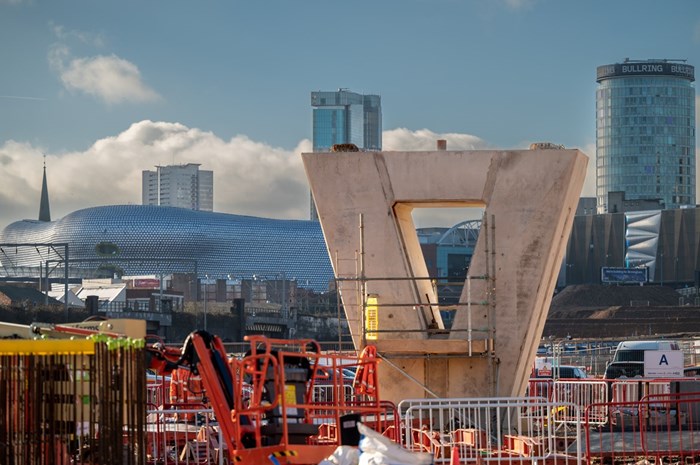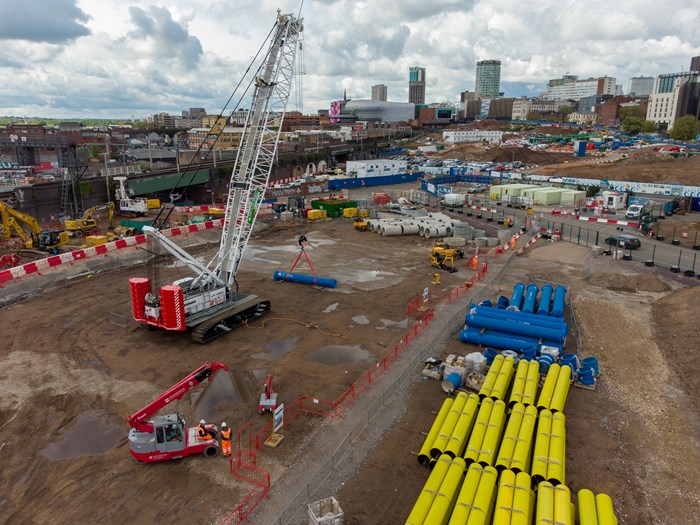HS2: Whats in it for me?
Published: Thursday 16 Mar 2023
When you think of HS2 what comes to mind? Ask anyone and they’ll tell you it’s little more than a ‘fast train to London’, giving those taking this journey an extra 40mins or so of their life back. Whilst this is true, the reality of benefits on offer often comes as quite a surprise.
HS2 is the largest infrastructure project in Europe, and it’s taking place right on our doorstep. The opportunity it brings is way ‘beyond building a railway’, and we expect to see the wider social, and economic impacts felt by the region’s citizens and businesses for generations to come. It’s a big statement, so why do we make this claim?
At the turn of the 19th century, Tipton and its neighbouring Black Country towns were in an ideal situation to capitalise on the production of iron. Tipton’s iron industry began to grow with the development of steam engines, large machinery, iron bridges, and the building of the railways. Manufacturing, including for the rail industry, became an important business for the West Midlands and supported the development of the first Industrial Revolution. Likewise, today the West Midlands has the chance to maximise the breadth of opportunities afforded by HS2 by creating cutting edge, new and emerging technology for the high-speed rail industry, and provide a lasting legacy for its people, business, and place.
But initial discussions with regional businesses have identified several barriers faced by those not just looking to engage with HS2, but the wider infrastructure, growth & regeneration opportunities available within this region. The following key priorities were identified:
- Materials & energy – costs & availability
- Freight & logistics – costs, availability & environmental impacts
- Cashflow & finance – availability
- Skills & resource – availability
- Digital & technical transformation

Curzon Street works
To address these and understand the barriers for engagement, the West Midlands Combined Authority (WMCA) has formed the ‘WMCA HS2 Strategic Supply Chain Panel (SSCP)’, consisting of business representatives from across the West Midlands.
Andy Street, Mayor of the West Midlands, says: “To maximise the long-term benefits of HS2, we want to see as many local businesses as possible engaged in the supply chain both directly and indirectly - not just bidding for work but winning it. The SSCP is an important part of that mission and I look forward to seeing us delivering on exactly that in the months and years ahead.”
Craig Humphrey, managing director, Coventry and Warwickshire Growth Hub, agrees: “Business owners want access to markets and opportunity to stimulate their innovation and growth. HS2 is one such opportunity that the SSCP can utilise as an enabler for business growth across our region. We need to ensure that we showcase the opportunities available to maximise the benefits that will be derived.”
This is no small feat; while it’s true that contracts for the construction of the railway itself can only be awarded by HS2 Ltd. and its tier 1 contractors, we can, and will get regional businesses to look beyond trains and rail tracks. We want them to see the wider opportunities available and make it clear how the wider West Midlands business community can claim a piece of the pie (remember the mantra – it’s not about trains and rail services, it’s ‘beyond building a railway’).

HS2 careers live event
Cllr Ian Courts, leader of Solihull MBC and WMCA portfolio lead for environment, energy and HS2, said: "The West Midlands is currently experiencing an economic boom brought about by the impact of HS2. These wider economic, social and business opportunities offer a fantastic springboard to enable our region’s diverse business community to grow and for new business to emerge. The West Midlands is in a strong position in regard to economic stability and is providing upskilling opportunities and long-term job prospects for our residents.
“Local businesses must be made aware of the opportunities, but they must also understand how to personally benefit from these. The WMCA is looking at ways to effectively inform and engage our region’s diverse business community.”
Looking at the wider economic benefits made available because of HS2, we can start to address some of the national challenges which impact our region, such as the housing shortage. Plans to deliver more than 25,000 new homes within close proximity to the two HS2 station sites here in the West Midlands have already been identified and are being progressed. This equates to 12% of the overall regional target of 215,000 new homes by 2035 set by Government.
Connectivity is key. Businesses must have good access to employees. This is fundamental in achieving the region’s growth expectations. The West Midlands is undergoing unprecedented economic growth, we must make the suburbs accessible and bring the labour market to our regional businesses. To improve connectivity £100s of millions is being spent on local public transport such as Metro tram extensions, Sprint – bus rapid transit (BRT), additional train stations on the Camp Hill line at Moseley Village, Kings Heath and Pineapple Road. We’re also building stations in Willenhall and Darlaston and station upgrades to University station in Edgbaston, all of which puts more than two million residents within 45 minutes of one of the two HS2 stations as well as major towns and cities within the West Midlands such as Dudley and Wolverhampton. This is providing previously unavailable pools of potential employees for businesses while giving local residents access to new jobs like never before.

Curzon Street Station site
The WMCA forecasts significant job growth not just because of an increase in construction but also because of the wider economic benefits that will be delivered in the region due to HS2. A revised WMCA HS2 Growth Strategy – The Defining Decade, published towards the end of the pandemic, found that up to 175,000 new or safeguarded jobs would be secured within the region.
As a direct result of HS2, over 12,000 jobs have been created in the West Midlands to-date. More than 622 previously workless job starts have now secured full time employment working on HS2, and NVQ3+ qualification attainment has increased by over 10 per centage points since the submission of the first WMCA HS2 Growth Strategy. There are a wide range of colleges and private training providers across the region, supporting residents with training and support to access employment opportunities associated with HS2.
This combined offer for employers and employees makes the region an attractive proposition for inward investment.
HS2 is also a major supporter of technical innovation, with West Midlands businesses and residents ideally placed to spawn cutting edge, new and emerging technology for the high-speed rail industry.
Craig Wakeman, head of transport implementation, Transport for West Midlands, says: “The West Midlands is at the heart of the new high speed rail network. The opportunities this provides for companies to diversify and become industry leaders through the development of ground-breaking technical innovation is an immense opportunity. This will enable the region to achieve sustainable growth, with our aim to export people, product & knowledge globally for generations to come – we must grab this ‘once in a lifetime’ opportunity with both hands.”
Clive Roberts, professor of railway systems and director of the Birmingham Centre for Railway Research and Education, said: “There are a vast range of opportunities for companies already working in, and also those new to rail. At the University of Birmingham’s Centre for Railway Research and Education we are supporting a number of regional innovation projects by providing specific technical support and/or guidance on how to navigate introducing products and services into the sector.”
Getting others to see past HS2 as only being relevant for those operating within in the rail industry is a challenge, but we must persist in shouting about this wider potential and engage our regional businesses to ensure as many as possible have fully grasped the opportunities being made available. There is still work to be done, but as a region we will embrace this challenge and see the West Midlands flourish.
Kai Ogunbanjo, managing director of Trinity Assets, said: “I am a keen explorer of business opportunities especially in an ever changing business and economic landscape where businesses have to adapt and quickly to respond to the market. This is the view I sought with HS2. HS2 is beyond just the rail industry, HS2 has trebled the size of my property development company which has impacted my supply chain from the solicitors involved in acquisitions and contracts, through to the local furniture suppliers and local trades people.”
We are on a mission to ensure our diverse business community see the possibilities and get involved.
If you would like to find out how your business can make the most of this once in a lifetime opportunity contact Kirstie Blakeman, HS2 Delivery Manager at West Midlands Combined Authority (kirstie.blakeman@tfwm.org.uk).
Further enquiries
For all other enquiries from members of the public go to our contact us page: https://www.wmca.org.uk/contact-us/
